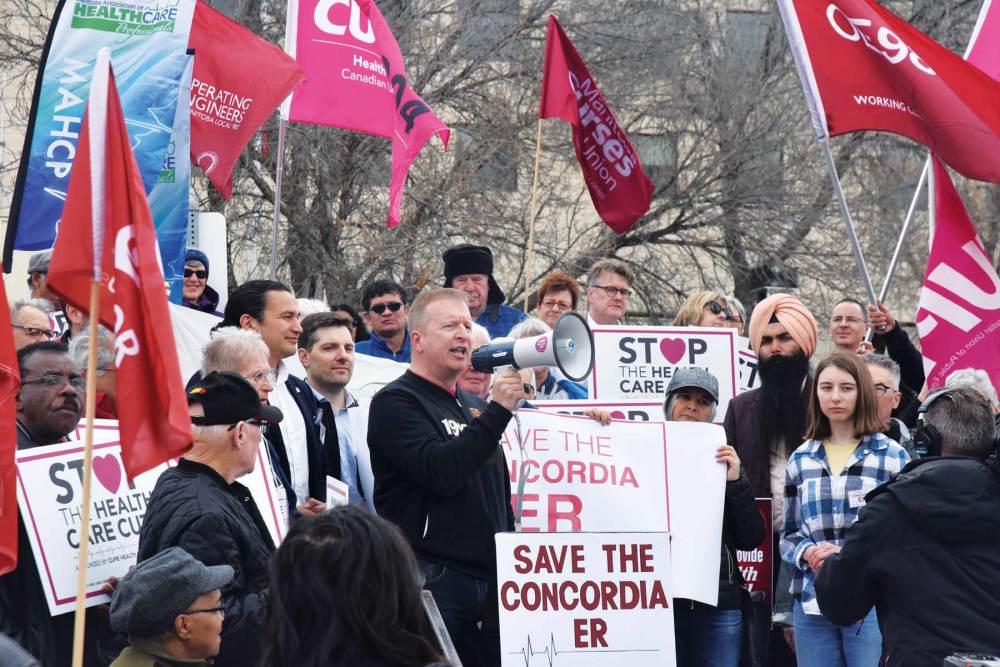Labour Landscape Facing Change And Challenge
Advertisement
Read this article for free:
or
Already have an account? Log in here »
To continue reading, please subscribe:
Monthly Digital Subscription
$0 for the first 4 weeks*
- Enjoy unlimited reading on winnipegfreepress.com
- Read the E-Edition, our digital replica newspaper
- Access News Break, our award-winning app
- Play interactive puzzles
*No charge for 4 weeks then price increases to the regular rate of $19.00 plus GST every four weeks. Offer available to new and qualified returning subscribers only. Cancel any time.
Monthly Digital Subscription
$4.75/week*
- Enjoy unlimited reading on winnipegfreepress.com
- Read the E-Edition, our digital replica newspaper
- Access News Break, our award-winning app
- Play interactive puzzles
*Billed as $19 plus GST every four weeks. Cancel any time.
To continue reading, please subscribe:
Add Free Press access to your Brandon Sun subscription for only an additional
$1 for the first 4 weeks*
*Your next subscription payment will increase by $1.00 and you will be charged $16.99 plus GST for four weeks. After four weeks, your payment will increase to $23.99 plus GST every four weeks.
Read unlimited articles for free today:
or
Already have an account? Log in here »
Hey there, time traveller!
This article was published 30/10/2021 (1498 days ago), so information in it may no longer be current.
Manitoba’s labour landscape has been defined by change and challenge for a long stretch now, but some hope exists on the horizon.
Kevin Rebeck, president of the Manitoba Federation of Labour, acknowledges that working families have had a tough go during the pandemic.
“There have been shutdowns and people working from home. Health and safety issues have certainly got more attention. I think one thing people have started to realize is the importance of paid sick days, something we’ve been calling for.’’

That call needs to be answered sooner rather than later, he adds.
“More than half of Manitoban workers have no paid sick days whatsoever. Far too many workers are stuck making that impossible choice: do I make ends meet and go into work contagious or do I stay home and not buy all the groceries that my family needs? It’s not fair.”
The labour federation remains hopeful that paid sick days could become a reality for all Manitoban workers.
“The sad part is the majority of workers that don’t have it are our lowest paid workers. The more you make, the more you’re likely to have these additional benefits — and it’s easy to try to forget about the others, which is wrong,” he says.
Additionally, says Rebeck, temporary measures put in place by the federal government need to be enshrined.
“Those measures need to be enshrined in provincial legislation permanently. We think all workers deserve 10 paid sick days — and at a time of pandemic, there could be 10 additional days available to them.”
The labour foundation is optimistic since some workers like teachers have recently gotten arbitration awards and school support staff have bargained similar increases.
“We have an agreement for nurses with real annual increases,” Rebeck adds.
“The reality is it’s not fair to let people fall behind inflation further and further, particularly people who have been standing up and performing critical work for all of us throughout the pandemic.’’
“More than half of Manitoban workers have no paid sick days whatsoever. Far too many workers are stuck making that impossible choice: do I make ends meet and go into work contagious or do I stay home and not buy all the groceries that my family needs? It’s not fair.”
– Kevin Rebeck
President, Manitoba Federation of Labour
He says it’s all about being fair.
‘’We want a fair deal and a fair process. That’s all we’ve ever wanted, and we’re fighting for it. Fair outcomes mean some mutual gains that the employers and workers can agree on and live with. We’re glad to see that.”
Rebeck is also pleased to see the demise of Bill 16, which would have brought changes to the Labour Relations Act.
“It would have eliminated some special language that we have in Manitoba that if a strike or lockout goes on for 60 days, that there’s a path to end it through a neutral third party who can reset the relationship and put a fair deal on. An arbitrator can do that, and both business and labour told government we like that system,” he says.
That’s the type of fairness Rebeck says he’s looking for.
“We’re glad the bill has died. We’re hopeful that a new premier is serious about listening to people and will not bring that kind of legislation back.”
There’s also room for improvement with Manitoba’s minimum wage, which recently increased by five cents to $11.95 per hour.
“It was embarrassing that we increased it by a nickel. It’s a poverty-level wage. People can’t make ends meet if they work full time and earn minimum wage. We’re among the lowest paid minimum wage workers anywhere in the country,” he says.

That needs to change, adds Rebeck.
“We’re hopeful a new premier will make that difference. And if business is serious about wanting to have people work, then they need to be serious about paying a fair wage, having fair benefits and having fair scheduling.”
Despite the challenges, there are also victories to celebrate.
Prior to the federal election, the federal government enacted new funding agreements with provinces, including Manitoba, where more childcare spaces are going to be created, with a 10-dollar-a-day childcare program eventually coming online.
“We want to make sure those new public dollars go into public and non-profit spaces and that early childhood educators are paid a good living wage job with paid sick days and benefits,’’ Rebeck says. ‘’Then we can build our economy up with those good jobs as well. It’s critically important in rebuilding our economy to make affordable high-quality childcare available.”

